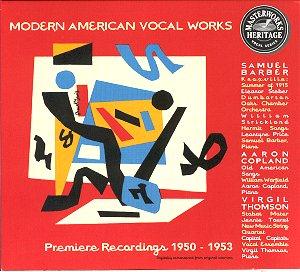MODERN AMERICAN VOCAL WORKS - PREMIERE RECORDINGS
1950-53
Samuel BARBER (1910-81) Knoxville
- Summer of 1915; Hermit Songs
Aaron COPLAND (1900-90) Old American
Songs (sets 1 and 2)
Virgil THOMSON (1896-1989) Stabat
Mater; Capital,
Capitals
 Eleanor Steber
(sop)/Dumbarton Oaks Orchestra/William Strickland. Rec 7 Nov 1950
(Knoxville)
Eleanor Steber
(sop)/Dumbarton Oaks Orchestra/William Strickland. Rec 7 Nov 1950
(Knoxville)
Leontyne Price (sop)/composer (piano) (Hermit) rec 19 Nov
1954
William Warfield (bar)/composer (Old American Songs) rec 16 Aug 1951,
18 Aug 1953
Jennie Tourel (mezzo)/New Music String 4tet (Stabat) rec 17 Apr
1951
Joseph Crawford (ten); Clyde S Turner (ten); Joseph James (bar); William
C Smith (bass); composer (piano) (Capital, Capitals) rec 11 May
1951
ADD mono
 SONY CLASSICAL
MHK 60899
[79.31]
SONY CLASSICAL
MHK 60899
[79.31]
Crotchet AmazonUK
AmazonUS
midprice

Sony should take a bow for making so many prestigious and wise judgements
in the production of this disc although as we shall see it is not all plain
sailing.
Taking the package in your hand you are instantly struck by the beauty of
it as an artefact. There is no jewel case; in its stead a fold out cardboard
cover into which is glued the booklet and a slip envelope for the disc. The
envelope is printed with the sort of 1950s instructional hi-fi, needle
replacement and record care information and line drawings that used to adorn
LP sleeves. The overall abstract design (by Stuart Davis) is taken from the
1950s LP cover for the Thomson Stabat Mater. Ned Rorem provides evocative
background notes though I would have welcomed some hard information as well
and more background on the works. Bless Rorem for mentioning Copland's music
for the film North Star.
Recording quality is good but Strickland's orchestra's hard wiry violins
in Knoxville (words by James Agee 1909-55 and the writer of
the poem Sure on this shining night, also set by Barber) are a
distraction. Steber's recording is a classic (she also commissioned the piece)
and deservedly so - quite enchanting. Her operatic experience did not spoil
her enunciation so, for the most part, you can make out what she is singing
even under pressure. She has a quick discreet vibrato. Of modern versions
I prefer Dawn Upshaw's on Teldec though I also have some happy memories of
Molly McGurk's Unicorn LP recording. If you want the words you will have
to look elsewhere. For all the sumptuous presentation SONY do not provide
texts for these vocal works. A great pity.
Hermit Songs was written by Barber for Price so this could
hardly be more definitive. Again an operatic voice is deployed and we might
fear that she would just flatten the words. After all the sessions took place
during a Porgy and Bess season. In fact Price is sensitivity itself
with care given to project the words. Rorem recounts how the premiere hit
the new dawn of what he calls the 'serial killers'. The composer and Price
were roundly booed with only the odd cheer here and there from the
'reactionaries'. The ten succinct settings will remind you, passingly, of
Britten but songs such as the Monk And His Cat (surely in Stephen
Sondheim's mind when he wrote Passion) and Desire For Hermitage
are big emotional statements and of course Price's voice was built for such
moments. She even essays a reasonable shot at an Irish accent!
Leaving Barber we move to Aaron Copland's Old American Songs
(both sets). William Warfield sings them to the manner born and immerses
himself in every mood. When he sings I bought me a cat or
Ching-a-ring chaw there is no hint of an artsong singer on condescension
holiday. They are sung with a sincere relish. There is quite a range of unstarchy
Americana here: spirituals, children's songs, tent evangelism, piano stool
ballads and minstrel ditties.
Virgil Thomson is represented by Stabat Mater setting
words by the French poet, Max Jacob (1876-1944), who was killed by the Nazis.
Jacob's poems were also set by Poulenc. The 5 minute setting is lent poignant
edge by the string quartet which has as its violist Walter Trampler. Tourel
(another operatic voice!) negotiates the Gallic rapids with a passable if
fallible accent. Gertrude Stein collaborated with Thomson on two of his operas:
Mother of Us All (1947) and Four Saints in Three Acts
(1934). Capital, Capitals is an experimental work of the
1927. Its text is typically loopy (and once grossly offensive) nonsense and
while it speaks in sentences do not strive too hard to find some meaning.
A curiosity - and candidly tiresome. Will we hear the work of Cornelius Cardew,
Stockhausen and the Tilbury circle in 2020 inn the same way? With the composer
at the piano (providing a pretty bare musical foundation) we can be reasonably
sure that this is an authoritative interpretation.
Knoxville was originally coupled with Barber's Four Excursions
(Rudolf Firkusny), Hermit Songs with Alexei Haieff's First Quartet;
Thomson with Lou Harrison and American Songs with some sea chanties.
I should have mentioned the wonderful handful of session photographs included
in the booklet.
Rob Barnett
BACKGROUND

